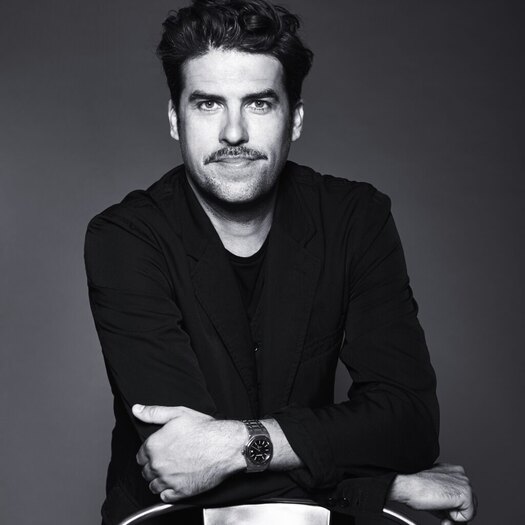
When three Parisians with an impressive array of skills and backgrounds – Sylvie Loday, Olivier Royère and Benoît Verdier – got together to start their own company in 2013, there was no guarantee of realising their ambitions. Especially in the ruthlessly competitive and ever-growing niche perfume sector. Nine years later, the trio can justifiably be proud of the success story that is Ex Nihilo.
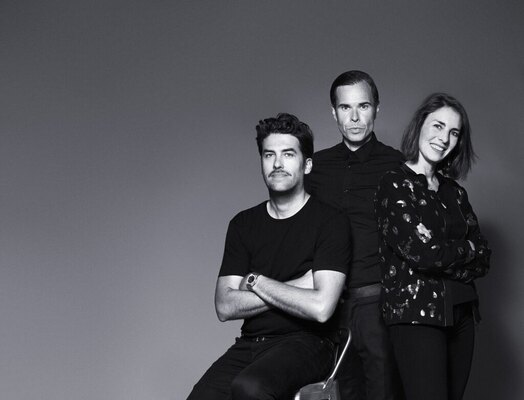
While decidedly French, their approach has a rebellious aspect too. The result? Impactful fragrances that are high on memorability and that put the expertise of the perfumers with which they collaborate (for example, Quentin Bisch, Natalie Gracia-Cetto and Jordi Fernández) in the spotlight.
Although the three share certain roles, Provence-born Benoît Verdier has become the public face of the brand. I got to meet him on a visit to South Africa earlier this year when he was touring the stores of the Ex Nihilo distribution partner in the country, Skins Cosmetics, and to launch the house’s latest release, Outcast Blue.
Despite his tight schedule and repeatedly answering the same questions, Benoît Verdier was exuberant and clearly in his element talking about all things Ex Nihilo (and the wider industry). As I wanted to interview him in more detail, we connected again over Zoom a few months later and chatted about risky business, sustainability and new projects.
What have you been up to since we last met in Johannesburg?
We are in Paris and will start to travel a lot from October. We opened a new flagship store in Taipei and in Riyadh, Saudi Arabia, and Doha, Qatar, just before the FIFA World Cup. So quite a lot to do.
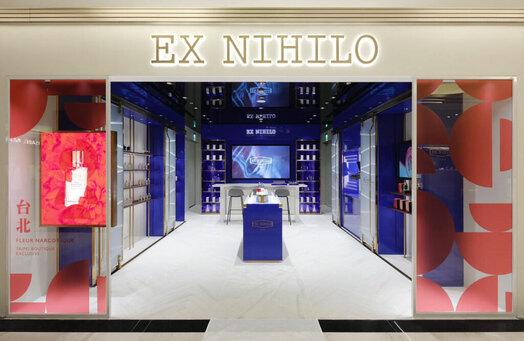
How did the three of you come together to found Ex Nihilo?
It’s quite a simple story. I studied with Olivier back in the day and we always wanted to create our own company. He was really passionate about fragrances and his grandfather was working in luxury already. His father was a diplomat so he was travelling the world. And he’s also my best friend.
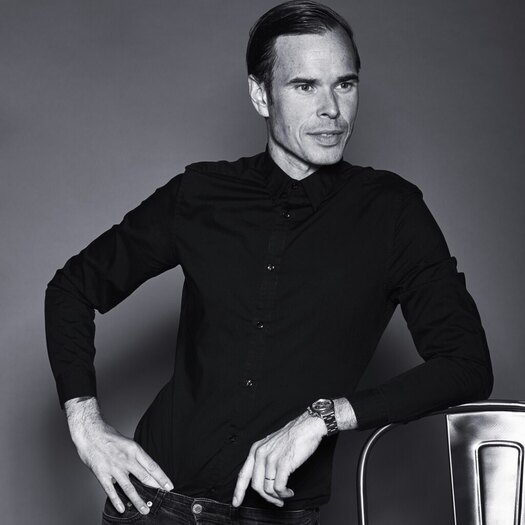
After our studies, we began working with various companies. Olivier started in L’Oréal as an intern and I was consulting for brands for marketing and luxury stuff, a lot of fragrances. In 2013, we decided it was the moment after our experiences to create the company. And we met Sylvie who was working for Givaudan [the Swiss fragrance and flavour company]. It was quite organic because I used to work with a lot of beauty brands from L’Oréal, Coty, LVMH, etc. Olivier had a background in finance.

And we decided to start from scratch. That’s why we chose the name “Ex Nihilo” [Latin for from or out of nothing] because when you start a new company, you also have the option to buy an old company and to market it and invent storytelling and narratives. But we wanted to start from nothing and create the brand of our dreams with inspiration from every field.
When we started, it was only the three of us plus one person for the production and a trainee for the design. So it was a bit of us against the world and nobody really believed in us [laughs].
Congrats, that means you’re heading for your 10th year in 2023…
Thank you, it’s a long and short story at the same time. We are expanding fairly fast. Our first flagship store in Paris was a risky strategy according to the rent and several other factors. But we said there are so many brands, we have to make a statement, do something different, we have to impress.
“We have to make a statement, do something different, we have to impress” – Benoît Verdier
It was a good strategy because we gained credibility, attracted the customers and beauty editors – Instagram was not so big then – and potential distributors.
Thanks to Fleur Narcotique by Quentin Bisch and The Osmologue [the brand’s innovative personalisation device, only available in flagship stores], we managed to have a great commercial success, so we could continue to grow. But honestly at the beginning it was risky. It looked very romantic, very Parisian, but when you haven’t been paid for a year…
How many people work for the brand now?
Everything is based in Paris where I am currently. At the beginning we were only four and used to work with agencies to out-source things like digital.
We decided to bring everything back in-house. There are 28 of us in Paris, perhaps 30 with interns, for marketing, communications, social media, graphic design, merchandising, packaging design, architecture and, of course, the products.
It’s a different configuration to what we started out with. In terms of business, it’s something you can manage better and to be true to what we do, we don’t have to explain ourselves to agencies and there’s more creativity. So we’re working like a little start-up.
Going back to the three of you, who does what?
We try to share. For creation in general, it’s more myself. I share the olfactory creation with Sylvie, as she has the background with Givaudan. Olivier is part of that, but also more the finances, HR and business aspects. Sylvie is more in charge of commercial development, the opening of new stores and corners.
You seem to be the public face of the brand. Was that planned?
It just happened. As we travel like crazy, we had to split the roles and as I’m in charge of communications and social media, I’m representing [the brand]. We try to share as far as we can, but it’s more my part.
“With Kilian [Hennessy] or Francis [Kurkdjian], it’s rare to see them. So we have an opportunity to be more accessible and spread the passion.” – Benoît Verdier
When I travel, I try to maximise by seeing our clients, our distributors, train our teams. It’s super important to be in the field. With Kilian [Hennessy] or Francis [Kurkdjian], it’s rare to see them, because they are superstars in a way. So we have an opportunity to be more accessible and spread the passion. Otherwise, we are just like other brands and people like that difference.

Let’s talk more about the fragrances specifically. Is there a molecule in common with all the Ex Nihilo fragrances? For example, I’m wearing Iris Porcelana, Midnight Special and Cologne 352. They’re very different, but there seems to be something in common…
You’re pointing out something interesting there. As we are working with so many different characters, perfumers, it is super difficult to keep that red line, or the blue line with Ex Nihilo [the brand’s colour]. So we spend a lot of time thinking about the collection and how we keep our olfactory identity.
There is no common ingredient, but we brief the perfumers the same way. We want something addictive, welcoming, immediate… we love the texture of materials. We want people to smell them.
I would say the only common point is the white musks we use when we see all our creations in a big panorama. For the florals to upgrade the bloom and sillage, for the orientals to give comfort and to melt on the skin…
It’s unusual that you haven’t discontinued any fragrances…
Because we are also customers. We know how frustrating that is. So we decided even if only a few people love a fragrance, we will keep it. If you can’t find it on shelf, because of distribution, you’ll find it on the website and we’ll send it directly to your home.
For example, French Affair by Quentin Bisch is not the most commercial and doesn’t sell like crazy. I love it personally and it’s part of our story.
You’ve recently gone the extrait de parfum route with Fleur Narcotique and Outcast Blue. What was the thinking behind that?
Maybe it’s the answer to things becoming too mainstream, so we try to push the creations to something even more exclusive and using higher concentrations of ingredients. It’s part of the strategy to push to the top.
It was not opportunistic in that sense. Both scents were perfect for it. It was a bit of an exercise in style to see what we can do.
In the portfolio we are also preparing new very concentrated oils for layering. We are also working on exceptional pieces that you can collect, only one fragrance made. Today, the focus is more on the top of the range.

And what about sustainability?
That’s essential. How to be super-luxury and using new Givaudan biotech ingredients. And to be more impressive with the packaging with no plastic and something that would surprise you.
When you see our packaging, it was already in our mind to use this kind of recycled foam to protect the fragrance from the sharks, the heat and the differences in temperature. It was a bit of a plastic garbage before and then it was transformed into a beautiful box, which you can use for a third time – it’s registered powder – in the industry.
The next development is how can we do the same with organic ingredients or even organic waste. But it’s tricky because if you communicate about something coming from waste, you have to convince people it’s worth it.
“If you communicate about something coming from waste, you have to convince people it’s worth it” – Benoît Verdier
For customers, there’s a lot of education, explaining why. In some markets, they’re chasing limited editions, something expensive, something flashy, but they’re not too concerned about ecology. Maybe in the US, UK, northern Europe, yes, France a bit. But in other parts of the world, it’s not such a priority. So we would like to make ecology sexy back [laughs] and desirable, but also luxurious.
For this year’s release, Iris Porcelana, you used a relatively unknown perfumer, Dalia Izem. How did that collaboration come about?
The Initiale Collection is inspired by the most iconic raw ingredients and we’ve been wanting to do an iris fragrance for a long time.
Dalia’s been living in Dubai and she told us she’d be very interested to work with us for the first time. She had many ideas about iris pallida from Tuscany. As you know, it’s an expensive ingredient, which takes about three years to grow, another three years to dry and then the processing of it.

We wanted to avoid the roughness, what you’d smell in a wet garden. On the contrary, we wanted to bring it to something more milky, powdery. She worked on it for about six to seven months. Originally, we were thinking something more classic like iris and leather, but decided to go for something softer, more enveloping and muskier to highlight the iris.
We’ve all smelt many iris fragrances over the years. This release is definitely iris, but distinctive in its own way with that Ex Nihilo touch. Well done!
Thank you. You must also discover our new one, Santal Calling, which we’ve just launched. It’s our interpretation of sandalwood album from Australia, with a milky accord on top and a bit of vanilla bourbon from Madagascar. It was created by Antoine Maisondieu.

Sounds fantastic. Love the name. Ex Nihilo fragrances always have sexy names. They’re provocative, catchy and memorable.
It’s not 50% of the game, but you have to make a statement, make people react. I have an app on my iPhone with all the names I can find. It can come from a song, pictures from an editorial in a magazine, a movie. I try to make an association that will also make sense with what we create.
There’s two ways to create a fragrance. It can start from the name, an idea we’d like to reflect in the smell. Or it can come directly from a crazy ingredient and then I try to find what could be the story around it.
Normally, when we brief the perfumer, we already have the name. It’s then easier for them to project into a universe. For Santal Calling, it was a lot about the Brancusi Scooter in Paris, very rough, very crafted, very abstract.
We give mood boards, pictures, everything, then the perfumer has the stories, the universe, the name and can work on the fragrance.
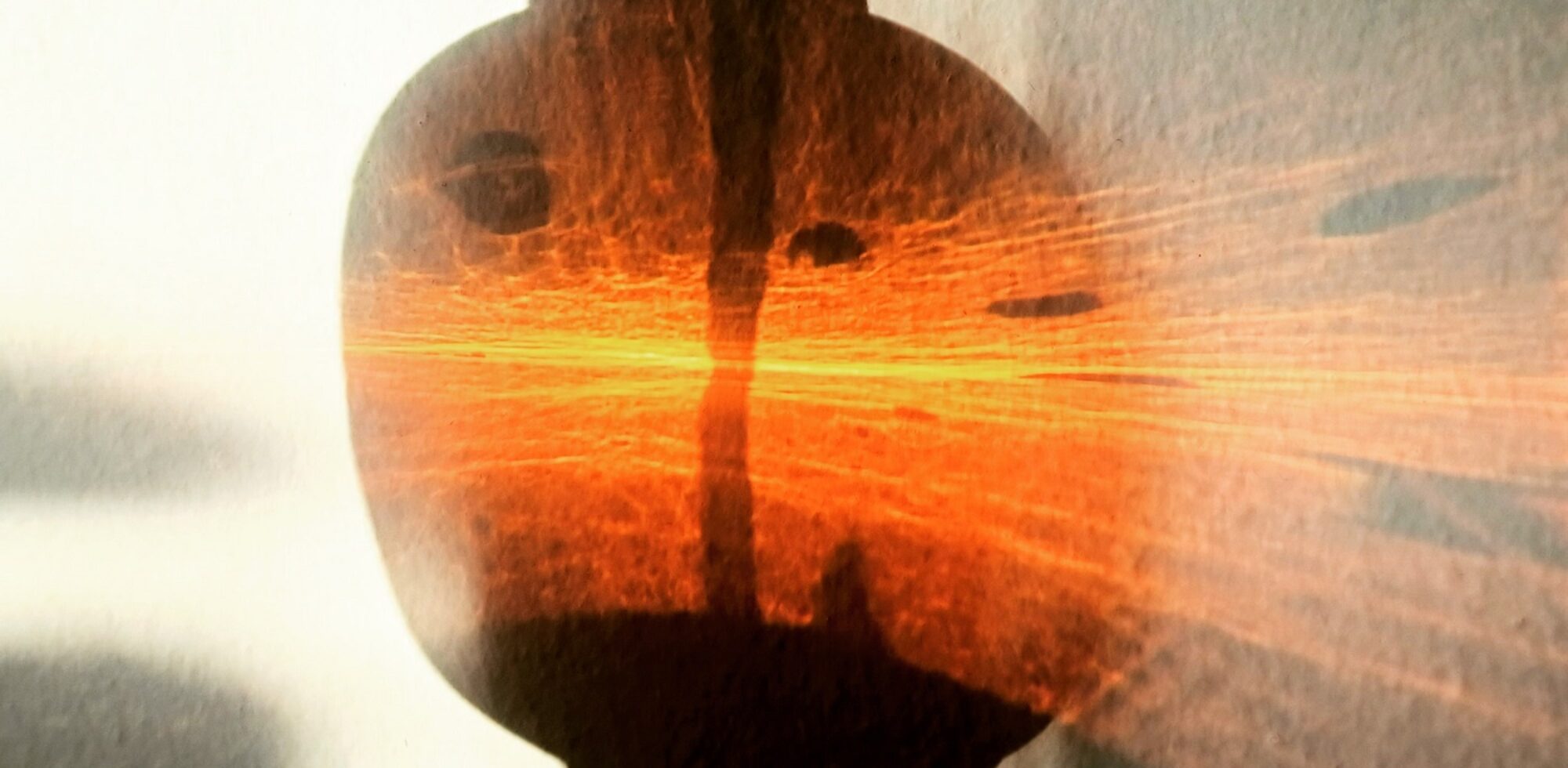
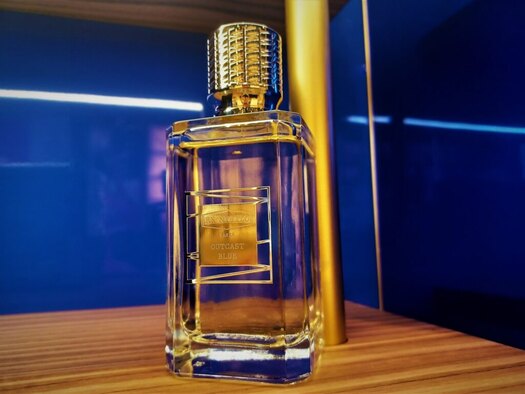
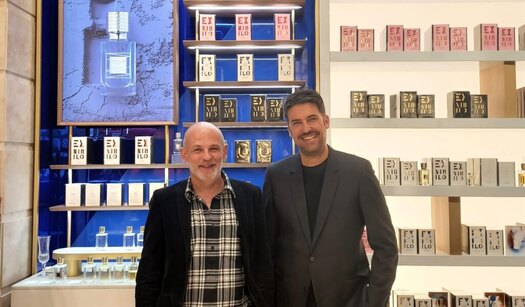
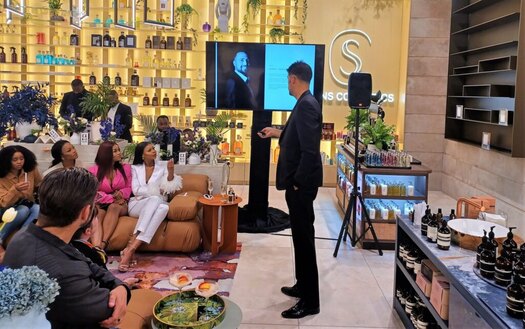

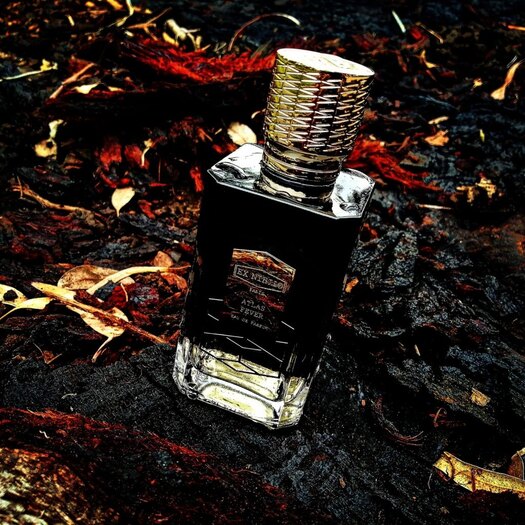
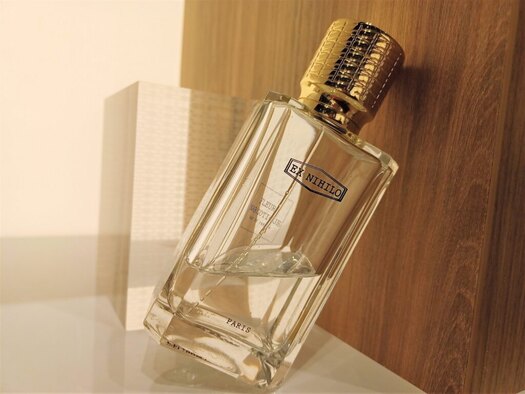
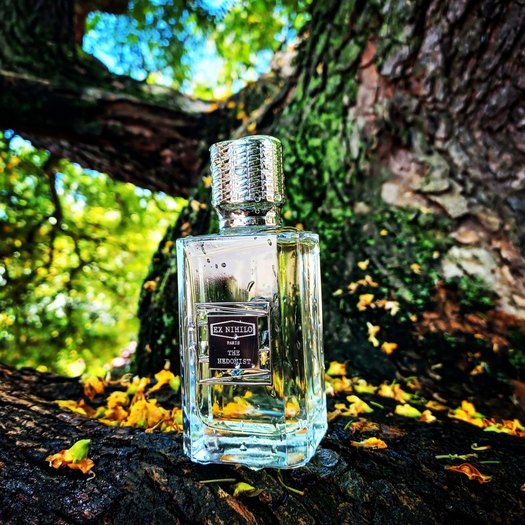





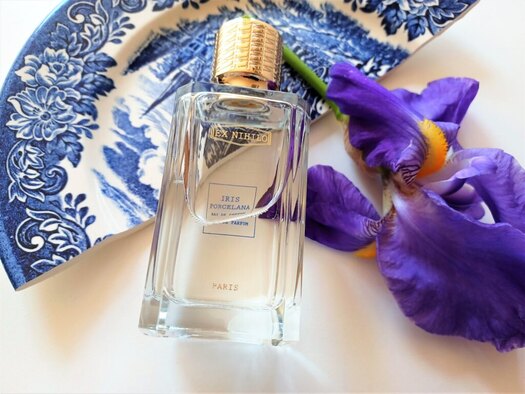


Interesting to learn more about their story. I liked their innovation of “Vases de Senteurs (an electronic system of dry diffusion, which prevents from “olfactory saturation”)” at some counters. These gadgets would diffuse a consistent scent upon pressing a button, which allows people to smell the drydown first and adds a nice tactile component to the exploration.
Thank you. That does sound innovative. Perhaps I’ll come across it sometime in the future.
Fascinating article as always, Rich. This is a brand I still need to sample, and you’ve certainly piqued my interest.
Thank you so much, dear Daniel. Definitely one for your list.
This is an excellent interview. I haven’t heard much about Ex Nihilo before, but this really piqued my interest. The scents and auras they’re describing sound lovely, and I really appreciate that they don’t discontinue any fragrances. The bottles are beautiful, too. It’s inspiring to read these sorts of success stories.
Big thanks, dear Sophie. The brand has many fantastic options to explore and I hope you find the one for you from their diverse selection. Love the bottles too.